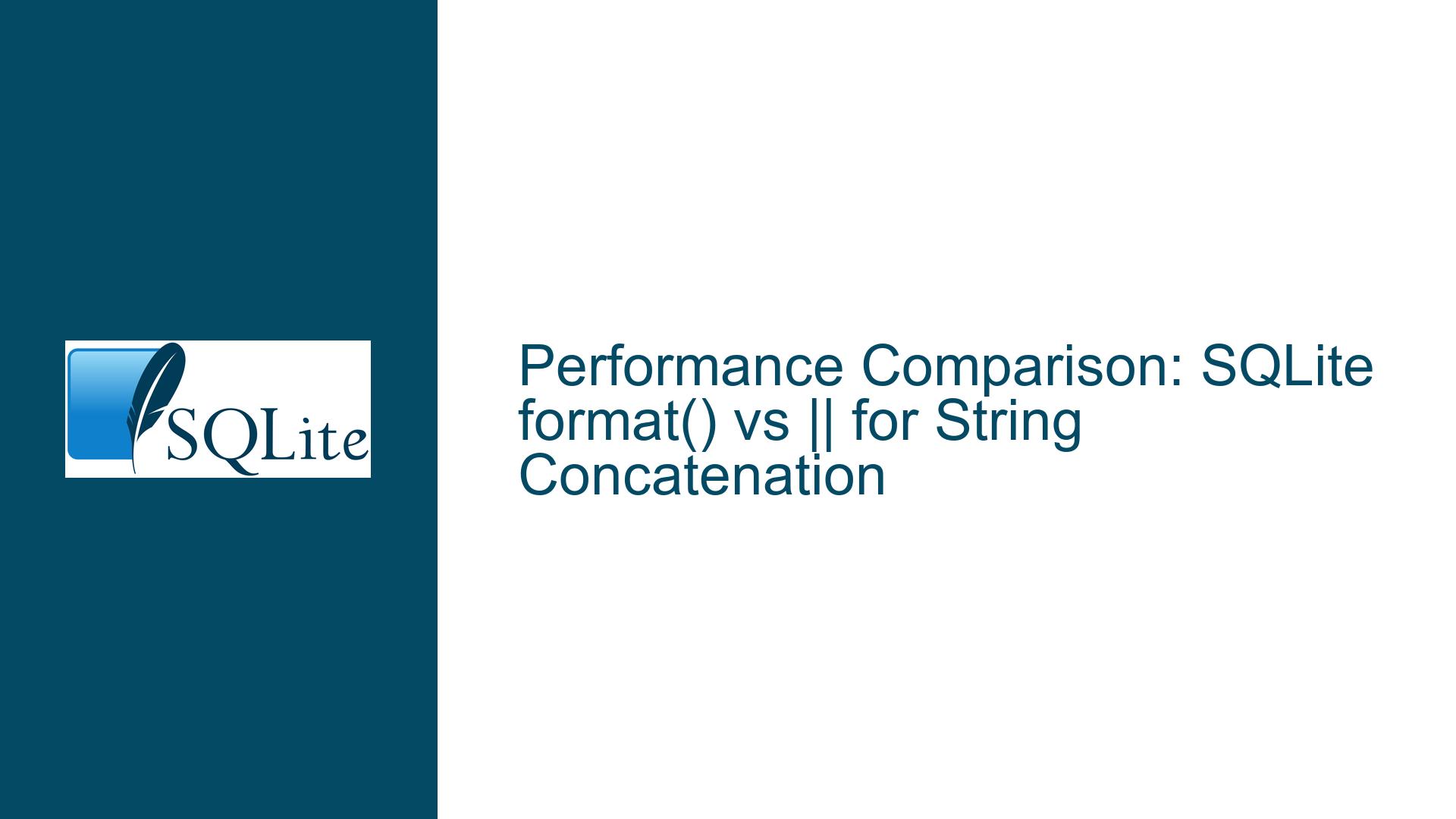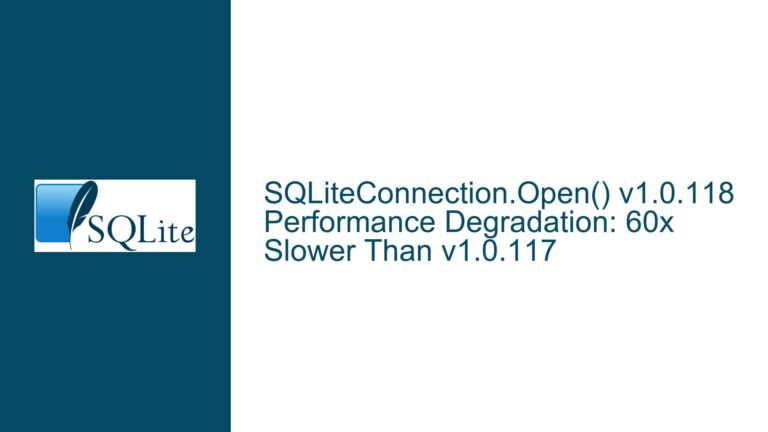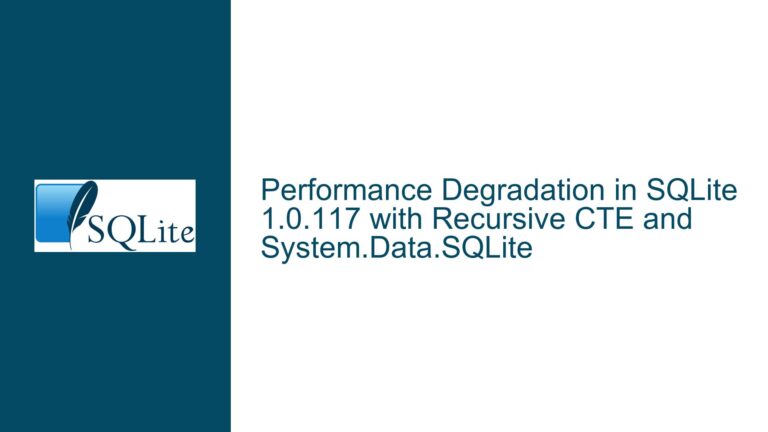Performance Comparison: SQLite format() vs || for String Concatenation
Understanding the Performance Implications of format() and || in SQLite
When working with SQLite, one of the common tasks is string concatenation, especially when constructing complex strings such as HTML or JSON directly within SQL queries. Two primary methods are often used for this purpose: the format() function and the || (pipe) operator. While both methods achieve the same end result, their internal workings and performance characteristics can differ. This post delves into the nuances of these two approaches, exploring their performance implications, potential bottlenecks, and best practices for their use.
The format() function in SQLite is a versatile tool that allows for string formatting, similar to the printf function in C. It takes a format string and a variable number of arguments, returning a formatted string as output. On the other hand, the || operator is a straightforward concatenation operator that joins two or more strings together. While both methods can be used to concatenate strings, they differ in their underlying mechanisms, which can lead to differences in performance, especially when dealing with large-scale string operations.
The Mechanics of format() and ||: Why Performance Might Differ
The performance difference between format() and || primarily stems from the additional overhead associated with the format() function. When format() is called, SQLite must first parse the format string to determine how to format the arguments. This parsing step involves identifying format specifiers (such as %s for strings or %d for integers) and mapping them to the corresponding arguments. Only after this parsing is complete can the actual concatenation occur.
In contrast, the || operator is a binary operator that directly concatenates two strings without any intermediate parsing step. This direct approach means that || can start the concatenation process immediately, potentially making it faster than format() in scenarios where the format string is complex or the number of arguments is large.
However, it’s important to note that the performance difference between these two methods is often negligible in practice. Both format() and || involve memory allocations and potential reallocations as the concatenated string grows in size. These memory operations are typically the most significant contributors to the overall execution time, especially when dealing with large strings. Therefore, while format() may have a slight overhead due to its parsing step, this overhead is often overshadowed by the time spent on memory management.
Optimizing String Concatenation: When to Use format() vs ||
Given the similarities in performance between format() and ||, the choice between them often comes down to readability and convenience rather than raw speed. However, there are scenarios where one method might be more suitable than the other.
For simple concatenation tasks, such as joining a few strings or variables, the || operator is often the more straightforward choice. Its syntax is concise and easy to understand, making it ideal for cases where readability is a priority. Additionally, because || does not involve any parsing, it can be slightly faster in situations where the format string is trivial or non-existent.
On the other hand, the format() function shines in scenarios where complex string formatting is required. For example, if you need to insert variables into a string at specific positions or apply specific formatting rules (such as padding numbers with zeros), format() provides a more flexible and powerful solution. While this flexibility comes at the cost of a slight performance overhead, the trade-off is often worth it for the improved maintainability and clarity of the code.
In cases where performance is critical, such as when constructing very large strings or performing concatenation operations in a loop, it may be beneficial to benchmark both methods using your specific data and use case. This empirical approach can help you determine which method performs better in your particular scenario, allowing you to make an informed decision based on actual performance data rather than theoretical assumptions.
Memory Management and Allocation: The Hidden Cost of String Concatenation
One of the often-overlooked aspects of string concatenation in SQLite is the impact of memory management on performance. Both format() and || involve dynamic memory allocation, which can be a significant bottleneck, especially when dealing with large strings or high-frequency concatenation operations.
When a string is concatenated using either method, SQLite must allocate memory to store the resulting string. If the resulting string is larger than the initially allocated memory block, SQLite may need to reallocate memory, which involves copying the existing string to a new location and freeing the old memory. This reallocation process can be time-consuming, particularly if it occurs frequently during a concatenation operation.
To mitigate the impact of memory reallocations, SQLite employs various optimization strategies, such as pre-allocating larger memory blocks to accommodate future growth. However, these strategies are not foolproof, and the performance of concatenation operations can still be affected by the frequency and size of memory allocations.
In scenarios where memory management is a concern, it may be beneficial to minimize the number of concatenation operations by batching them together or using alternative approaches, such as constructing strings in the application code rather than within the SQL query. By reducing the number of memory allocations and reallocations, you can improve the overall performance of your string concatenation operations, regardless of whether you use format() or ||.
The Role of String Literals and Optimization Opportunities
Another factor that can influence the performance of string concatenation in SQLite is the use of string literals. String literals are constant strings that are known at compile time, such as "Hello, World!". When string literals are used as operands in concatenation operations, SQLite may be able to optimize the operation by pre-computing the result or reducing the number of memory allocations.
For example, consider the following query: SELECT 'Hello, ' || 'World!';. In this case, SQLite can recognize that both operands are string literals and concatenate them at compile time, resulting in a single string literal "Hello, World!". This optimization eliminates the need for runtime memory allocation and concatenation, making the operation significantly faster.
However, this optimization is more straightforward for the || operator than for the format() function. Because format() involves parsing a format string and mapping it to arguments, it is more challenging for SQLite to optimize concatenation operations involving string literals. As a result, the || operator may have a slight performance advantage in scenarios where string literals are involved.
Best Practices for String Concatenation in SQLite
Given the various factors that can influence the performance of string concatenation in SQLite, it’s essential to follow best practices to ensure optimal performance and maintainability. Here are some recommendations:
Use
||for Simple Concatenation: For straightforward concatenation tasks, such as joining a few strings or variables, prefer the||operator. Its simplicity and lack of parsing overhead make it the more efficient choice in these scenarios.Use
format()for Complex Formatting: When you need to insert variables into a string at specific positions or apply specific formatting rules, use theformat()function. Its flexibility and power make it the better choice for complex string formatting tasks.Benchmark Both Methods: If performance is a critical concern, benchmark both
format()and||using your specific data and use case. This empirical approach will help you determine which method performs better in your particular scenario.Minimize Memory Allocations: To reduce the impact of memory management on performance, minimize the number of concatenation operations by batching them together or constructing strings in the application code rather than within the SQL query.
Leverage String Literals: When possible, use string literals as operands in concatenation operations. This allows SQLite to optimize the operation by pre-computing the result or reducing the number of memory allocations.
Consider Alternative Approaches: In some cases, it may be more efficient to construct complex strings, such as HTML or JSON, in the application code rather than within the SQL query. This approach can reduce the complexity of the query and improve performance by offloading string manipulation to the application layer.
Conclusion: Balancing Performance and Readability in String Concatenation
In conclusion, the choice between format() and || for string concatenation in SQLite involves a trade-off between performance and readability. While || is generally faster and more straightforward for simple concatenation tasks, format() offers greater flexibility and power for complex string formatting. By understanding the underlying mechanics of these methods and following best practices, you can make informed decisions that balance performance and maintainability in your SQLite queries.
Ultimately, the performance difference between format() and || is often negligible in practice, and the choice between them should be guided by the specific requirements of your use case. Whether you prioritize speed, readability, or flexibility, both methods provide robust solutions for string concatenation in SQLite, allowing you to construct complex strings with ease and efficiency.






